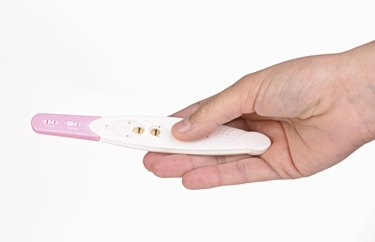
Although menstruation doesn't happen during pregnancy, some people do experience vaginal bleeding in early pregnancy and it can often be mistaken for a period. In fact, approximately one-quarter of pregnant people experience bleeding in the first trimester, according to Marjorie Greenfield, M.D., contributor to DrSpock.com. This can make determining whether or not you're pregnant very difficult if you're used to having a very short period. But there are some ways to differentiate between implantation bleeding and a period, even if your period is usually only a couple days long.
Step 1
Analyze the bleeding. Vaginal bleeding that is light and occurs shortly before an expected period may be something called implantation spotting. Implantation spotting occurs when an embryo implants into the lining of the uterus. If the vaginal bleeding was much heavier than normal, it may be a sign of a serious medical condition.
Video of the Day
Make a note of the color and flow of the bleeding and any other symptoms experienced with the bleeding. They should also consider if the bleeding occurred at the same time as their expected period or if it occurred before or after it.
Step 2
Check for early pregnancy signs. Many people experience specific symptoms early in pregnancy, including fatigue, nausea, swollen or tender breasts, frequent urination, darkening of the areolas on the breast and headaches, explains the American Pregnancy Association. Although people can experience these symptoms without being pregnant, having many of these symptoms may indicate a pregnancy is likely.
Step 3
Take a pregnancy test. Although most people can use a home pregnancy test to determine if they are pregnant, some who have experienced vaginal bleeding may want to consider going to the doctor and getting a beta hCG test, also referred to as a quantitative blood pregnancy test. This test can detect pregnancy just 10 days after conception, according to the National Institutes of Health, and tends to be more accurate than home pregnancy test.
Step 4
Talk to a doctor. Regardless of the results of the pregnancy test, you should always discuss unusual vaginal bleeding with a doctor.
Tip
Although the expected due date of a pregnancy is often calculated based upon the last menstrual period, vaginal bleeding during early pregnancy may make it difficult for some people with shorter periods to know when their last menstrual period occurred. It may be necessary to calculate the due date of the pregnancy using an ultrasound instead.
Warning
In addition to normal menstruation, medical conditions including infections of the uterus or cervix, problems with birth control, fibroids or polyps, problems with blood clotting and cancer of a reproductive organ, may cause vaginal bleeding, according to the American Congress of Obstetricians and Gynecologists. If you experience vaginal bleeding that is different from your usual period, you should always talk to a doctor.
Video of the Day